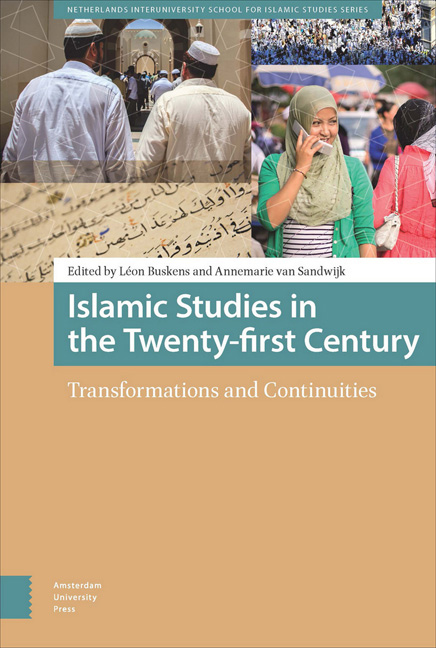Book contents
- Frontmatter
- Dedication
- Contents
- Preface
- Introduction: Dichotomies, Transformations, and Continuities in the Study of Islam
- Islamic Texts: The Anthropologist as Reader
- Textual Aspects of Religious Authority in Premodern Islam
- What to Do with Ritual Texts: Islamic Fiqh Texts and the Study of Islamic Ritual
- Textual Study of Gender
- Scholarship on Gender Politics in the Muslim World: Some Critical Reflections
- Power, Orthodoxy, and Salvation in Classical Islamic Theology
- Dialectical Theology in the Search for Modern Islam
- “Classical” Islamic Legal Theory as Ideology: Nasr Abu Zayd’s Study of al-Shafiʿi’s al-Risala
- Islamic Law in the Modern World: States, Laws, and Constitutions
- Vernacular Cosmopolitanism as an Ethical Disposition: Sufi Networks, Hospitality, and Translocal Inclusivity
- Middle Eastern Studies and Islam: Oscillations and Tensions in an Old Relationship
- Notes on Contributors
- Overview of NISIS Autumn Schools, 2010-2014
- Index
Introduction: Dichotomies, Transformations, and Continuities in the Study of Islam
Published online by Cambridge University Press: 12 December 2020
- Frontmatter
- Dedication
- Contents
- Preface
- Introduction: Dichotomies, Transformations, and Continuities in the Study of Islam
- Islamic Texts: The Anthropologist as Reader
- Textual Aspects of Religious Authority in Premodern Islam
- What to Do with Ritual Texts: Islamic Fiqh Texts and the Study of Islamic Ritual
- Textual Study of Gender
- Scholarship on Gender Politics in the Muslim World: Some Critical Reflections
- Power, Orthodoxy, and Salvation in Classical Islamic Theology
- Dialectical Theology in the Search for Modern Islam
- “Classical” Islamic Legal Theory as Ideology: Nasr Abu Zayd’s Study of al-Shafiʿi’s al-Risala
- Islamic Law in the Modern World: States, Laws, and Constitutions
- Vernacular Cosmopolitanism as an Ethical Disposition: Sufi Networks, Hospitality, and Translocal Inclusivity
- Middle Eastern Studies and Islam: Oscillations and Tensions in an Old Relationship
- Notes on Contributors
- Overview of NISIS Autumn Schools, 2010-2014
- Index
Summary
Introduction
This book aims to offer an overview of some of the important issues in the study of Islam that scholars discuss at present. The study of Islam is part of a tradition that started in Western academia on a professional scale about two centuries ago, and has always been linked to social concerns. At the beginning of the nineteenth century the major question was how to govern Muslims living in the newly established colonies, such as British India, the Dutch East Indies, and, later, French Algeria. About a century later colonial government still was an important issue, linked at that time to the declaration of jihad by the Ottoman caliph in an effort to help his German allies. Again a century later questions of governance continue to play a crucial role, now mainly linked to the presence of Muslim citizens in Europe, the control of natural resources in the Middle East, and to what is perceived as global security and a “war on terror.” Scholars have managed to capitalise on these public issues, not only to make a living, but also to pursue their intellectual interests. They have constituted an impressive body of knowledge, even if this is not always as useful or made use of as much as the authors might suggest in their applications for funding.
This academic tradition has not only led to an accumulation of knowledge, even if some of it is almost forgotten or badly neglected, but has also witnessed major changes in interests, questions, methods, aesthetics, and ethics. Although interest in travelling in the Muslim world and gathering information through autopsy, exchange with local erudites, and collecting was practiced earlier on, as the work of Carsten Niebuhr (1733-1815), for example, demonstrates (cf. Kommers 1982; Vermeulen 2008), the past four decades show a notable shift from philological and historical to anthropological and other social science approaches to Islam. In some countries the dominance of anthropology is now being replaced by the primacy of political science and its offspring, such as international relations and security studies.
The Netherlands has played an important role in establishing this academic tradition.
- Type
- Chapter
- Information
- Islamic Studies in the Twenty-first CenturyTransformations and Continuities, pp. 11 - 28Publisher: Amsterdam University PressPrint publication year: 2017



